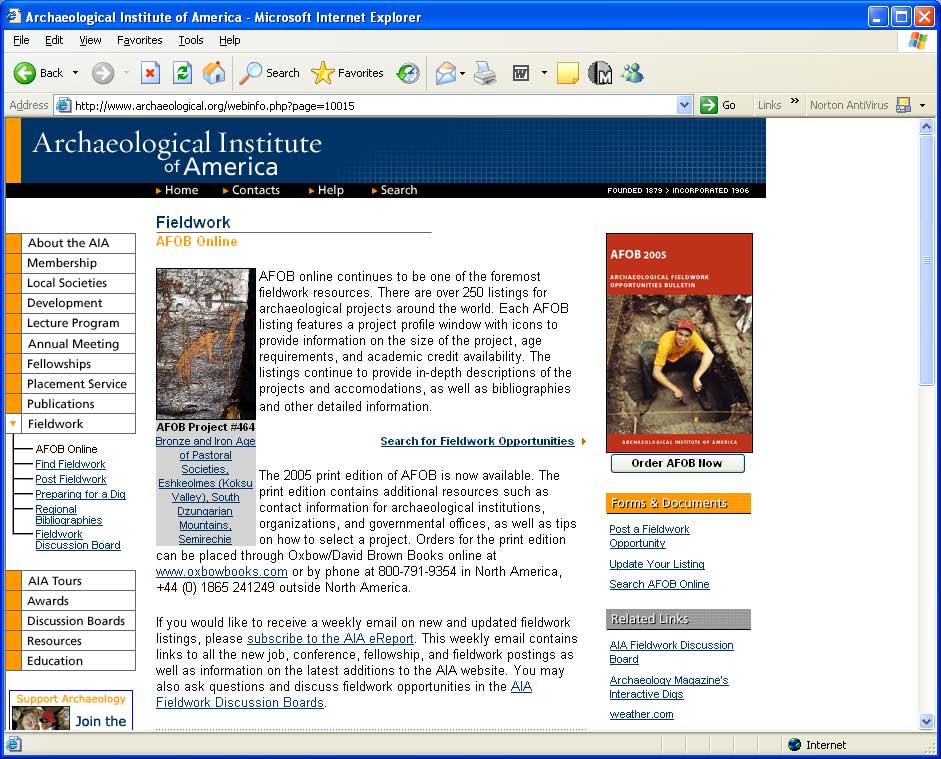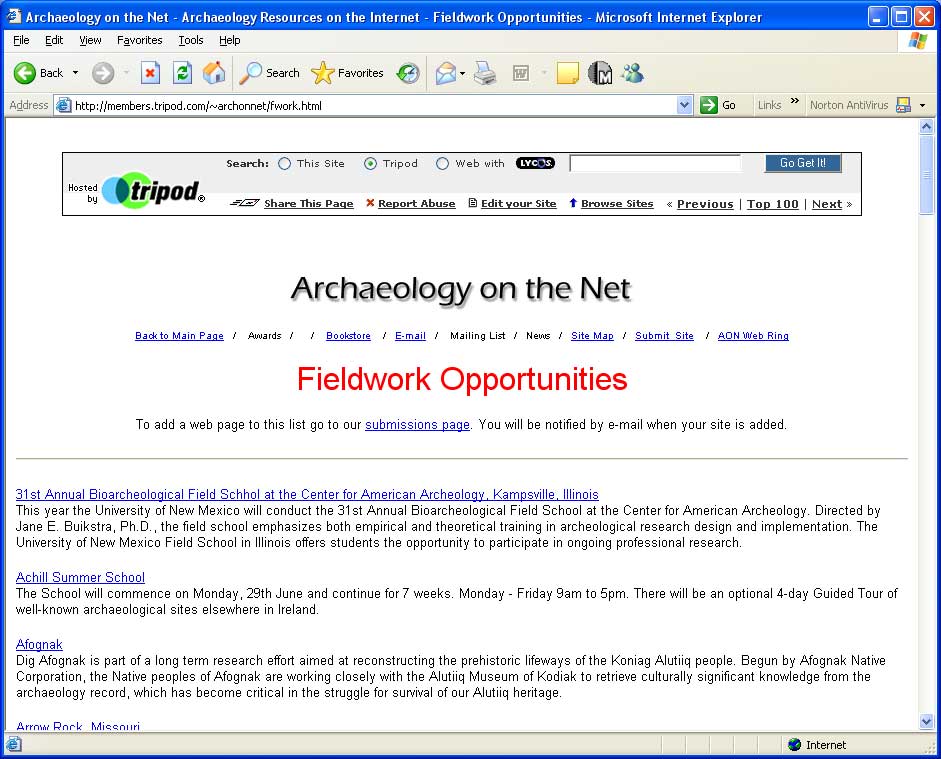
|
|

|
|
Ruiha Webster
Both 'Archaeology on the Net' (http://members.tripod.com/~archonnet/fwork.html) and 'AFOB Online' (http://www.archaeological.org/webinfo.php?page=10015) provide listings of worldwide archaeological fieldwork opportunities. I compared the two by looking at factors such as usability, links, content and general design.
Archaeological Institute of America -- AFOB Online:

The Archaeological Institute of America has produced a professional site which appears to be updated on a regular basis (copyright 2005 is indicated). The user knows who the site has been published by as the Fieldwork section states this clearly on the home page. The Fieldwork section is obviously part of a larger site and so maintains the structure of the parent site. The topical menu remains in the left column, with a general menu beneath the banner at the top of the screen.
The purpose of the Fieldwork section is clearly indicated, paragraphs are well delineated and images help break the page. The coverage offered by the menu links is well considered and practical, leading to a variety of areas covering finding fieldwork, posting fieldwork, preparing for a dig, regional bibliographies and a fieldwork discussion board. The final link on that list leads outside the main site to the 'AIA forums' site. Although this is a minor issue, perhaps this could have opened in a new window, as there is no link to take you back to where you came from. All 'Related Links' open into new windows, allowing a return to the original site with ease. Unfortunately the last two links were broken.
The few advertisements that exist are relevant to the site (such as the 'AFOB Bulletin' or 'Join the AIA'). The only outside ad noted was a link to the Barnes & Noble site, which provides online shopping for the books listed in the bibliography. The bibliography is listed geographically to aid users in their searches for material relevant to their interests. The lists contain titles published as recently as 2003 and cover a range of topics for each region.
The main purpose of AFOB Online is to show global fieldwork listings. The site does this, starting with the choice of a colourful world image map or a drop-down menu. Users can click on the area of the map of interests (although no 'alt' tags are present to aid the disabled). Clicking the map leads to a full list of programmes in that region. There was no further breakdown so that my 'European' search mixed all countries into one list. There was no obvious order to the list. A further breakdown is necessary (by date, country or state) to make this aspect of the search facility more user-friendly.
The drop-down menu offers greater specification as users are able to type in a country after selecting the region. Other criteria offered for searching include programme type, date or keyword. Again there is no obvious sorting order to the results but my results were smaller (more specific) this time and therefore easier to browse through.
Clicking on a project of interest presents the user with detailed, practical information about the fieldwork including dates, specific location, contacts, description, affiliation and accommodation. The database behind this part of the site appears to have been well-designed for its purpose. Unfortunately the 'return to search results' link did not work; after using the 'back' button on my browser I was taken to the initial search page and had to re-run my search.
I cannot vouch for the comprehensiveness of the listings. I am personally aware of only a few fieldwork opportunities around the world and one of those was not on this database. Even so there were plenty of other programmes listed to keep my interest. I did like the section called 'Preparing for a Dig.' Someone, like me, who hasn't been on a dig, should find the advice practical and helpful.
The site is easy to navigate and the material is appropriate for its purpose. Although some of the links were broken when I reviewed the site, that hasn't put me off bookmarking AFOB Online to use alongside similar resources when I start looking for fieldwork possibilities.

Unfortunately the Archaeology on the Net listing of fieldwork opportunities is far less valuable. Indeed, there are not many positive comments to make about this site. It was last updated in 1998! That alone indicates that the information presented is too old to trust. There is no indication of who has produced the site or of its main objective, but it is part of a Web Ring called Archaeology on the Net. The Ring is apparently hosted by Tripod; however, the base page has disappeared. Although many of the other pages of the Ring are still up, the absence of the main page makes it seem that the Ring has collapsed.
There are a number of faults with this site. Two of the first six links on this page were dead ends which gave me little confidence in the rest of the links. The links that comprise the main menu often take you to a '404 error' message and none of the 'back to home page' links that I tried throughout the entire site took me to the home page. (I'm still not sure which page is the real home page.) The 'banner exchange' is irrelevant to the topic of archaeology; there are a number of pop-up advertisements; some of the menu items are not links to begin with; there is an 'under construction' page (which serves no constructive purpose); and to top it off the 'Submit site' link took me to a home improvements page!
The only possible use for this site would be to obtain a directory listing of previous fieldwork opportunities in the hope that these programmes are still in operation. With luck, the link on the page may work; otherwise there is enough information for a search engine to find the organisation. The list is purely alphabetical. There are no options to search by other criteria, such as location (it has worldwide coverage), which makes browsing for a specific result time consuming.
Basically, give this site a miss.
-- Ruiha Webster
To send comments or questions to the author, please see our email contacts page.
For an index of other CD and Web site reviews available on the Web pages of the CSA Newsletter, see the review index.
For other Newsletter articles concerning the use of electronic media in the humanities, consult the Subject index.
Next Article: Thank You, Dr. Philip Chase
Table of Contents for the Spring, 2005 issue of the CSA Newsletter (Vol. XVIII, no. 1)
 Table of Contents for all CSA Newsletter issues on the Web
Table of Contents for all CSA Newsletter issues on the Web
| CSA Home Page |